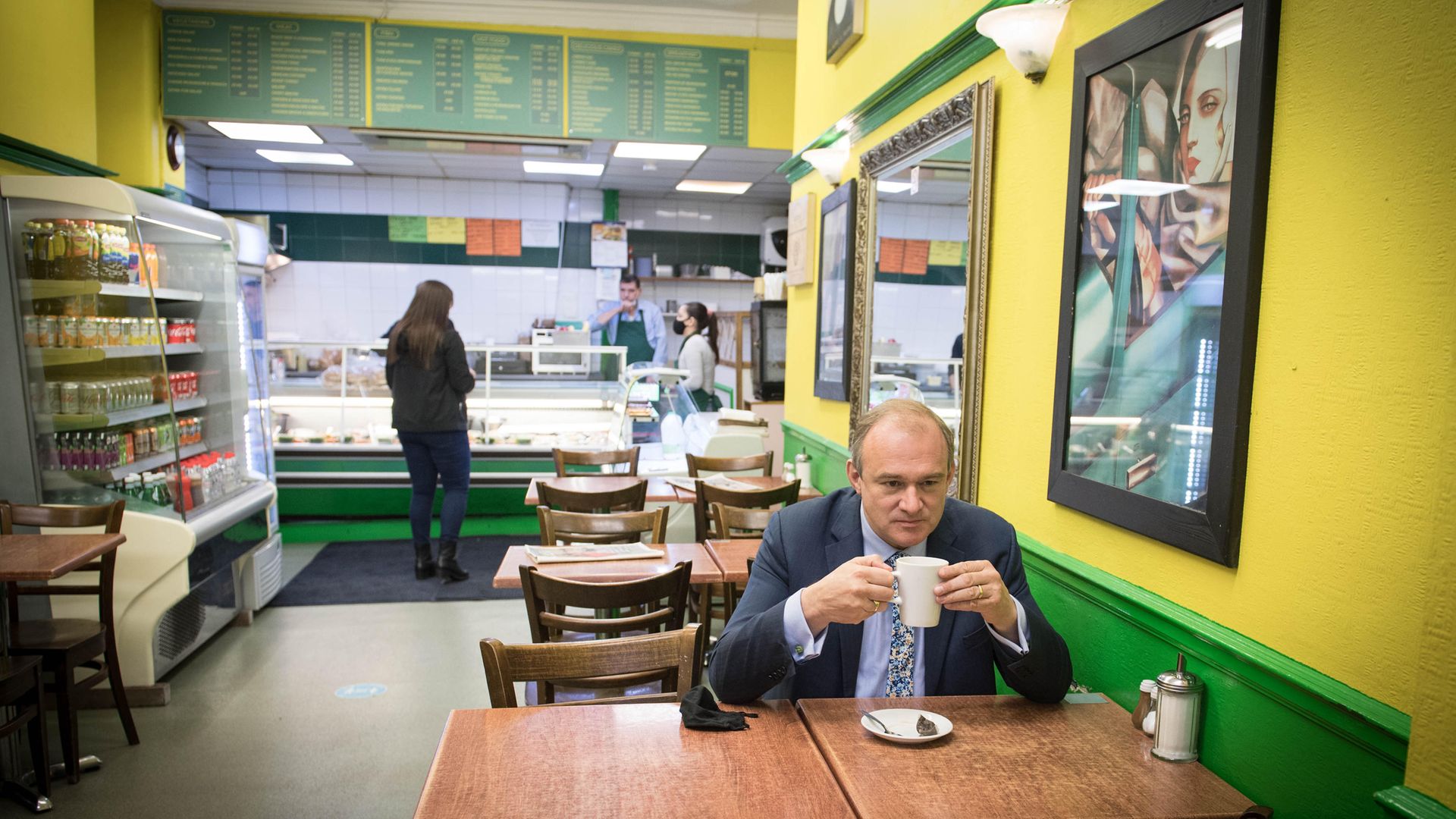Sir Ed Davey’s hopes of a triumphal Lib Dem autumn conference following the party’s success in the Somerton and Frome by-election have been imperilled by a peculiarly embarrassing diary clash. The conference opens in Bournemouth on precisely the same day as the National Rejoin March takes place in London.
“The last thing we want is a desultory turnout on the first day, but we’re hearing from a lot of party members who intend to vote with their feet on the National Rejoin March on September 23,” whispers my man at Lib Dem headquarters. “Ed’s decision to row back from our unambiguous policy of rejoining the EU has never been popular with the rank and file. Those that decide to march will be eloquently absent from conference.”
Brexit is the issue that dare not speak its name so far as the party’s high command is concerned – invitations to the event had promised discussions on the nation’s health, the climate crisis, housing, Ukraine, standards in public life and food and farming, but not you-know-what – and membership numbers have fallen back since Davey repudiated the rejoin policy.
Organisers of the National Rejoin March through London anticipate a record turnout since it will represent the last opportunity for voters across all the parties to make their views known ahead of the election.
Peter Benson, one of the organisers, says he is thrilled so many Lib Dems will be joining the march.
“We are not worried if we clash with any of the main political parties as they are the ones clashing with an increasing majority of the public when it comes to Brexit,” he says. “We would be happy to livestream Sir Ed Davey from the conference if he is willing to talk about rejoin – and put forward a timeframe to rejoin – but we would prefer to see him in person. We’d even be willing to give him the first speaking slot so he can get back to his conference quickly.”
Benson adds helpfully that there are trains from Bournemouth every half hour to London Waterloo, which is just a short walk from Parliament Square where the marchers will be gathering.
He may have fallen below Coutts Bank’s wealth criteria but any suggestion that Nigel Farage is in penury would appear to be somewhat wide of the mark. A quick look at recent filings for his business Thorn in the Side show that he has lately purchased a new £575,000 beachfront house in Kent through the company.
The all-cash transaction brings his property holdings to around £2m. His new retreat, with uninterrupted sea views on the dunes at Lydd-on-Sea, is just a few doors away from another seaside house bought by Farage via his company in 2020. That cost £499,995 but it’s been revalued at £600,000.
In addition to these properties, Farage retains ownership of his former marital home in Westerham, also in Kent. A mortgage loan from Coutts apparently taken out in 2018 has now been cleared, and it was this that allowed Coutts to close the former Ukip and Brexit Party leader’s account once he fell below their thresholds of £1m in investments or borrowing, including a mortgage, or at least £3m in savings.
Farage’s grievances against Coutts – amplified by the fact he can still dominate the front pages of right wing newspapers – resulted in Dame Alison Rose stepping down as the chief executive of its parent company NatWest, followed by Peter Flavel, the Coutts boss.
Still, the real scalp that Farage and the government – which still owns 38.6% of NatWest – are after is Sir Howard Davies, its chairman, and an outspoken critic of Brexit. A headline in the Times business section over the weekend perhaps showed the country had reached peak economic illiteracy: “Pressure on NatWest grows after sharp jump in profits – chairman resists call to stand down.”
Lloyds Bank’s understandable desire to get shot of the Daily Telegraph and the Spectator as soon as possible – they seized control of the titles after a £1bn loan to the Barclay family turned bad – took a step forward with Goldman Sachs appointed to oversee the sale. Mandrake remains of the view that a valuation anywhere near the touted £600m is wishful thinking, not least because, despite total subscriptions approaching the 1 million mark, the print side of the Telegraph operation is now seen as a liability, the business is rumoured to be highly geared and the fact that Lloyds will not have much time to haggle.
“All the parties involved are acutely conscious that a sale could be a lot harder to effect under a Labour government,” one insider tells me. “The Daily Mail group remains one of the most probable purchasers and the last thing anyone would want is Labour fretting about competition issues or the fact that a potential proprietor wasn’t domiciled here for tax purposes.”
Others mooted include Daniel Kretinsky, a Czech billionaire with a big stake in West Ham United; Sir Paul Marshall, a hedge fund tycoon who already has money in GB News; and Rupert Murdoch, who is understood to be interested only in acquiring the Spectator. Ensuring the titles end up in the hands of a very right wing owner are clearly in the best interests of the faction that now leads the Tory party, and, so long as the individual also has very deep pockets, Lloyds Bank’s.
Rupert Murdoch once used to grant more audiences to Rishi Sunak than even his arch toady Boris Johnson, but just lately their passion appears to have cooled.
The bunker mentality of Downing Street – some are saying the prime minister and those around him have lost the will to live – is reflected in the fact Sunak held just seven meetings with members of the press between January and March and not one with Murdoch himself.
Four of the meetings are reported as “social” and the other three “to discuss the PM’s priorities,” which suggests they were very short. Socially, Sunak met the BBC chairman Richard Sharp – his resignation over the Boris Johnson loan scandal didn’t come until April – in addition to Ted Verity, the Daily Mail editor, Tim Shipman from the Sunday Times, and Aidan and Howard Barclay, just before they were ousted as owners of the Telegraph group.
Sunak discussed his priorities with the broadcaster Robert Peston, Victoria Newton of the Sun and Chris Mason, political editor of the BBC.
Just before the EU referendum in 2016, the JCB chairman Lord Bamford wrote to his 6,500 employees in the UK to tell them that he was confident that the UK, as the fifth-largest economy in the world, could stand on its own two feet.
Last year the UK dropped to the sixth-largest economy in the world, and Bamford, while in no way apologetic about the position he took on Brexit, could only plaintively wail in an interview he gave over the weekend: “Isn’t our country in a mess now?”




